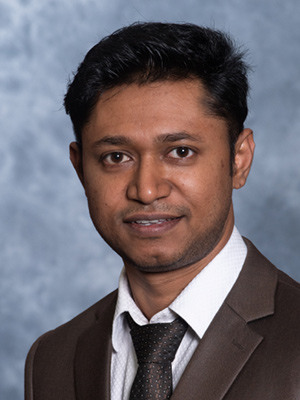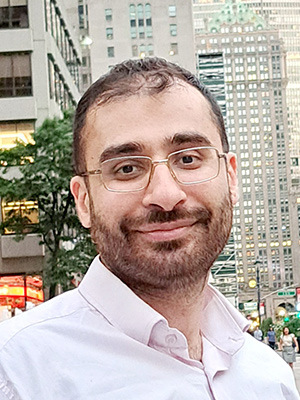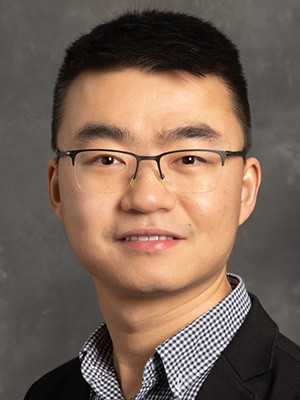The rules are simple: within three minutes, explain graduate-level research in a way that engages a lay audience, underscores the work’s significance to society at large and enthusiastically conveys a powerful narrative.
Simple, but not easy—in a strictly timed setting with only one static slide to condense an entire thesis into a few minutes, graduate students at the University of South Carolina have an immense challenge before them. Yet, for almost a decade, the Graduate School has hosted the internationally acclaimed 3 Minute Thesis competition to encourage students at all levels of graduate education to learn to communicate their research effectively to varied audiences, and year after year, they have risen to meet the challenge.
This year’s top presenters stood out for their strong hooks, use of clear and effective language, and genuine enthusiasm for research, but at the end of the final heat, three competitors remained whose presentations were particularly engaging and impressive.
Meet this year’s winners.
Md. Fakhruddin Patwary, postdoctoral fellow in chemical engineering, 1st place
Oil is nothing new to Md. Fakruhddin Patwary. After earning his bachelor's degree in chemical engineering in his home country of Bangladesh and pursuing his master’s, also in chemical engineering, from Abu Dhabi, he went on to work in oil refining for the petrochemical industry.

Still, as he settled into his career, he felt a draw to academia. Patwary knew he wanted to pursue catalyst synthesis and characterization, key elements of his interest in chemical engineering, but it was chance and good timing that brought him to the university and into contact with John Regalbuto’s catalyst research in association with the Savannah River National Lab. Patwary and Regalbuto developed new catalysts to reduce oil viscosity and investigate how the honey-like substance can be made to flow more smoothly through pipelines using heated metal particles.
Excited to present his work, Patwary entered the 3 Minute Thesis competition—for the first time, in 2022. He was eliminated in the first round, but he remained determined. Though Patwary knew his research topic was solid, he also recognized that the preparation process was a key element in developing his acumen as a presenter, and he threw himself into his work for the 2023 competition. It paid off.
“I did not really go there with the hope that I would win, I just wanted to prove myself and correct my mistakes that I did last time. Being in the second round, I was already happy,” says Patwary. “Winning this 3MT boosted my confidence about presentation.”
Patwary will go on to compete at the Conference for Southern Graduate Schools in February 2024. After that, his future plans remain open to various possibilities.
“I like research. It’s exciting to me,” says Patwary. “I don’t mind being a teacher or being in the industry. I enjoy when there is research involved or the job gives me the feeling that I’m doing something impactful. That’s enough for me.”
Fakhreddin Emami, Ph.D. student in mechanical engineering, 2nd place
Fakhreddin Emami, a Ph.D. student and research assistant in mechanical engineering, has a fairly interdisciplinary approach to his field, earning his bachelor's degree in civil engineering from Iran and his master’s degree in structural engineering from Michigan State University.

But when his mentor, Andrew Gross, began recruiting students to help research a NASA project on space travel to Venus, Emami had a unique opportunity to try something really different.
Fortunately, with his background in solid mechanics and computational science, Emami was up to the challenge. Relying on his expertise in the mechanics of metamaterials, Emami designed a ceramic truss lattice material that is light enough to be buoyant in space yet strong enough to withstand the heat and crushing pressure of Venus’ atmosphere. This metamaterial serves as a superb thermal insulator, safeguarding scientific devices in the airship from the extreme temperatures of Venus, which can reach up to 500°C. Remarkably, these properties have never been observed simultaneously in a material before.
He didn’t stop there. “The majority of things researchers do in academia, typically, have a specific purpose, but many of them at the end do not find their way to the real world or industry,” says Emami. “I was interested to see if I could sell what I’ve done to people who are not in this very specific domain, to the people who don’t know the details.”
Emami’s goal of effectively communicating his research to non-specialists landed him second place. Looking ahead, he hopes to further his research as a post-doc or as a computational scientist in industry.
At the front of his mind is his work on metamaterials. “In science fiction movies, you often see scenes where characters use a special cloak that magically makes them disappear-- That's no longer confined to science fiction; these days, we can design photonic metamaterials that achieve the same effects, materials with exceptional properties you cannot find in nature,” says Emami. “I’m very interested in extending the application of these materials from the academic labs to real world and industry.”
Zhendong Zuo, Ph.D. student in quantitative marketing, 3rd place
Zhendong Zuo is the first to admit that his pathway to studying quantitative marketing is unconventional. From majoring in French as an undergraduate student in Shanghai to the master’s in management he earned in France and the second master’s he obtained in business research in the Netherlands, the path has been winding.

“I feel like it’s a touch of destiny,” says Zuo. But it’s also a blend of aptitude, interest, a unique perspective on marketing and personal connections to his research area.
Like the rest of the world, the coronavirus pandemic brought many of Zuo’s personal and professional activities to a screeching halt. At home with little else to do, he turned to social media for entertainment and discovered something that caught his attention: livestream selling.
Using humor and compelling storytelling, influencers flocked to the internet to livestream sessions where they would highlight products to sell on a commission. Zuo was fascinated. “I felt that this was something very entertaining and could be a new marketing phenomenon,” he says.
His next stop? The Darla Moore School of Business, where he dove headfirst into collecting data on sales and marketing campaigns, harnessing his passion for quantitative data and statistical modeling to determine impact. Starting with livestream selling, Zuo explored the question of whether the strategic use of popular product collections in live sessions impacted sales—and it did.
The findings mean much more to Zuo than a successful first thesis project. “I’m from a small village; we don’t have many job opportunities. Same with my cousins. So livestream selling is a way to survive in these small villages,” he explains. “If I can help them to survive in this field, it has a real economic and societal impact.”
His top three placement at the 3MT competition was similarly meaningful beyond the success alone. “I feel very honored,” says Zuo. “I didn’t imagine I could be there. Going through this whole process, standing there making a speech to a group of people you don’t know, makes me more confident about my communication skills.”
Going forward, Zuo is excited to continue his research in digital marketing, social media platforms and their relationship with sociopolitical issues. His goals are ambitious but timely in an increasingly interconnected online landscape. Says Zuo, “I want leverage social media to make a better world.”